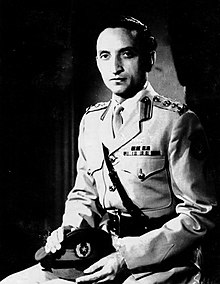Yaqub Ali Khan | |
|---|---|
| صاحبزادہ یعقوب خان | |
 as a Brigadier in 1950s | |
| 15th & 17th Minister of Foreign Affairs | |
| In office 11 November 1996 – 24 February 1997 | |
| President | Farooq Leghari |
| Prime Minister | Malik Meraj Khalid |
| Preceded by | Asif Ahmad Ali |
| Succeeded by | Gohar Ayub |
| In office 21 March 1982 – 20 March 1991 | |
| President |
|
| Prime Minister | |
| Preceded by | Agha Shahi |
| Succeeded by | Akram Zaki (acting) |
| Special Representative of the Secretary-General for Western Sahara | |
| In office 23 March 1992 – August 1995 | |
| Preceded by | Johannes Manz |
| Succeeded by | Erik Jensen |
| Pakistan Ambassador to the United States | |
| In office 19 December 1973 – 3 January 1979 | |
| President | Fazal Illahi |
| Prime Minister | Zulfikar Ali Bhutto |
| Preceded by | Sultan Mohammed Khan |
| Succeeded by | Sultan Mohammed Khan |
| 10th & 12th Governor of East Pakistan | |
| In office 1 March 1971 – 7 March 1971 | |
| President | Yahya Khan |
| Prime Minister | Nurul Amin |
| Preceded by | Vice Admiral Syed Mohammad Ahsan |
| Succeeded by | Lt. Gen. Tikka Khan |
| In office 23 August 1969 – 1 September 1969 | |
| President | Yahya Khan |
| Preceded by | MGen Muzaffaruddin |
| Succeeded by | Vice Admiral S.M. Ahsan |
| Personal details | |
| Born | Mohammad Yaqub Ali Khan 23 December 1920 Rampur State, British Indian Empire |
| Died | 26 January 2016 (aged 95) Islamabad, Pakistan |
| Citizenship |
|
| Political party |
|
| Spouse | Begum Tuba Khaleeli |
| Relatives | Fauzia Kasuri (niece) |
| Alma mater | |
| Cabinet | |
| Nickname(s) | SYAK Prince Soldier |
| Military service | |
| Allegiance | |
| Branch/service | |
| Years of service | 1940–1971 |
| Rank | |
| Unit | 18th Cavalry, Armoured Corps |
| Commands | |
| Battles/wars | |
| Awards | |
| S/No. | PA – 136 |
Lieutenant General Sahabzada Mohammad Yaqub Ali Khan SPk (Urdu: صاحبزادہ یعقوب خان ; 23 December 1920 – 26 January 2016)[1] was a Pakistani politician, diplomat, military figure, linguist, and a retired general in the Pakistani Army.[2]
After the Partition of India in 1947, he opted for Pakistan and joined the Pakistan Army where he participated in the Indo-Pakistani war of 1965. He was the commander of the army's Eastern Command in East Pakistan. He was appointed as governor of East Pakistan in 1969 and 1971 but recalled to Pakistan after he submitted his resignation amid civil unrest. In 1973, he joined the foreign service and was appointed as the Pakistan Ambassador to the United States and later ascended as foreign minister, serving under President Zia-ul-Haq in 1982.
His stint as foreign minister played a major role in the Soviet intervention in Afghanistan (1979–89) and he took part in negotiations to end the Contras in Nicaragua (1981–87) on the behalf of the United Nations. In the 1990s, he served as an official of the United Nations for Western Sahara until he was reappointed as foreign minister under Prime Minister Benazir Bhutto. After retiring from diplomatic services in 1997, he spent his remaining years in Islamabad and died in Islamabad in 2016.
- ^ Cloughley, Brian (5 January 2016). A History of the Pakistan Army: Wars and Insurrections. Skyhorse Publishing, Inc. ISBN 978-1-63144-039-7. Retrieved 6 September 2016.
- ^ Roberts, Sam (28 January 2016). "Sahabzada Yaqub Khan, Pakistani Diplomat, Dies at 95". The New York Times. Retrieved 6 September 2016.